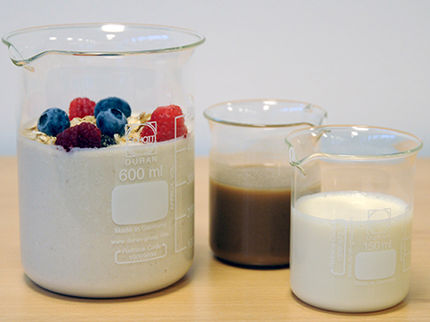Upcycling jackfruit seeds from waste to food-grade gold
Scientists develop a sustainable method to produce lactic acid, indispensable in industrial food production, using waste jackfruit seeds
Scientists from Nanyang Technological University, Singapore (NTU Singapore) have developed a sustainable and more effective technique for making lactic acid, by using discarded jackfruit seeds.
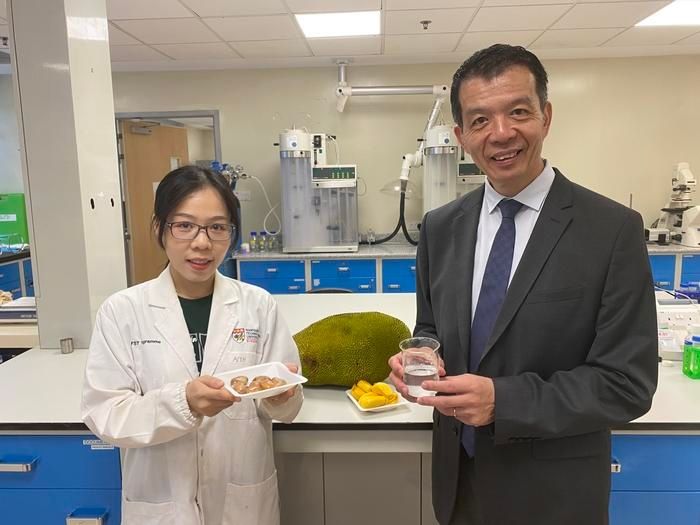
(L-R) First author of the study, Ms Tram Anh Ngoc Le, a PhD student from the Food Science and Technology (FST) programme at NTU, and NTU Professor William Chen, Director of the Food Science and Technology, presenting jackfruit seeds and the lactic acid produced from the seeds.
NTU Singapore
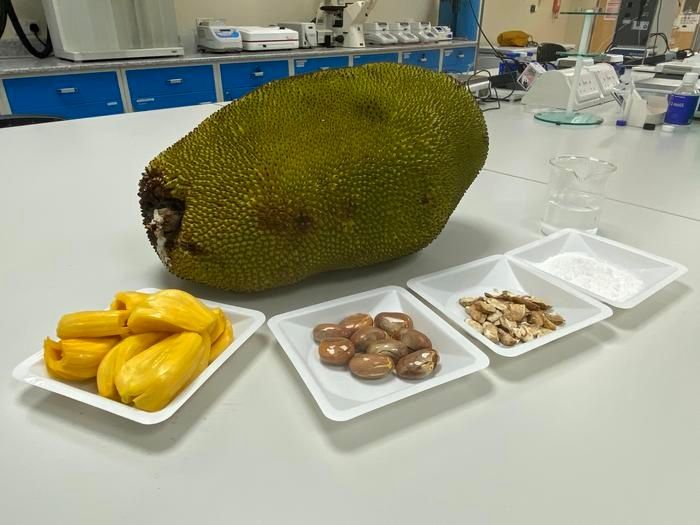
A side-by-side presentation of a jackfruit, its fruit, seeds, the powder from its freeze-dried seeds, and lactic acid produced from the seeds in a beaker.
NTU Singapore
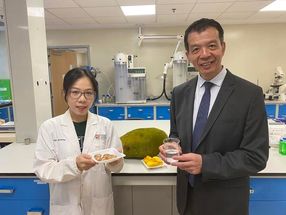
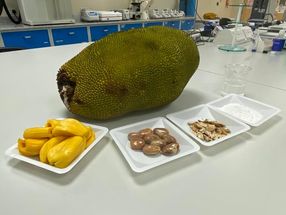
Lactic acid plays an indispensable part in the industrial production and preservation of nearly all the food we consume, being used in various stages of the manufacturing of food staples such as bread, yoghurt, cheese, kimchi, sauerkraut, and pickles. In 2022, approximately 1.5 million metric tons of lactic acid were manufactured worldwide.
Lactic acid is added to dairy products for a tangy taste, controls acidity in jams and canned fruits, and extends the shelf life of packaged meat products. In baking, lactic acid conditions dough for better texture and volume. Additionally, lactic acid helps in emulsification of dressings and sauces and maintains vibrant colours in fruits and vegetables.
The NTU-developed method is cheaper and more sustainable than existing industrial methods as it requires fewer chemicals and processes, produces negligible amounts of by-products, and reduces food waste by using unwanted jackfruit seeds.
Current industrial methods to produce lactic acid are costly as they typically involve fermenting raw materials such as sugarcane, corn starch and beetroot sugar, which have become more expensive due to the increasing scarcity of farmland, natural disasters, and rising inflation.
Industrial methods also result in large amounts of by-products, such as gypsum, which release greenhouse gasses when not disposed of properly.
Jackfruits are increasingly popular in diets worldwide, with their flesh, which resembles meat in both taste and texture, being made into meat substitutes. However, its seeds, which make up nearly a fifth of the fruit’s total weight, are thrown into landfills.
The study, which presents an innovation that reduces waste, reflects NTU's commitment to mitigate our impact on the environment, one of four humanity’s grand challenges that the University seeks to address through its NTU 2025 strategic plan.
Professor William Chen, Director of NTU’s Food Science and Technology (FST) programme, who led the project, said: “Our jackfruit seed-based method to produce lactic acid is another success for NTU in finding new uses for products that would otherwise be left to waste. Upcycling these products to cultivate lactic acid, an indispensable component for nearly all the food we eat, is an opportunity for enhancing processing efficiency in the food supply chain, while addressing two main pressure points for the food industry – rising costs of production and waste management.”
The NTU innovation has been received positively by several NTU industry partners. Ms Mirte Gosker, Managing Director of The Good Food Institute Asia Pacific, said: “Building a more secure, sustainable, and just food system is not merely a choice in Asia – it is a necessity. Doing so requires harnessing the full power of locally relevant ingredients to satisfy surging global protein demand, reduce waste, and further optimise the plant-based food supply chain. By utilising previously discarded jackfruit seeds, the novel lactic acid production method created by NTU’s Prof William Chen is a compelling example of how we can make more with less.”
The findings were published recently in the peer-reviewed Journal of Functional Foods.
Relying on good bacteria: Nature’s little helpers
To produce lactic acid from jackfruit seeds, the NTU scientists first washed the seeds, before adding sodium hydroxide at room temperature. This is a common process to remove skins from fruits and vegetables for canning, before freeze-drying the seeds and blending them into a powder.
They then added lactiplantibacillus plantarum, a ‘good’ bacterium that is commonly found in probiotics, to the jackfruit seed powder. It takes about two days to break it down into sugars and lactic acid, the latter of which is later extracted during a filtration process.
Prof Chen added: “We are confident that our technique could become a powerful tool for manufacturing companies to produce lactic acid. On one hand, it already uses several common production techniques that are already in use in food processing facilities, such as freeze-drying, starch filtration, and the extraction of lactic acid. On the other hand, the feedstock of our lactic acid is a ubiquitous unwanted product – jackfruit seeds. It has a much lower cost than current feedstocks, corn and beetroot starch, and the usage of a waste product would reflect well on corporations as they strive towards sustainability goals. A necessary difficulty, however, would be getting the jackfruit seeds to the lactic acid producers, but that could be easily addressed by making some adjustments in the food supply chain.”
First author of the study, Ms Tram Anh Ngoc Le, a PhD student from the FST programme at NTU, said: “Who knew that the jackfruit tree that grows rapidly all-over Southeast Asia could have the potential to address the world’s current food issues, such as tackling food waste, food scarcity because of inflation, and food insecurity. Not only is the jack fruit a nutrient-dense food product that could feed starving millions, but we have uncovered that its seeds hold even more promise in cutting down on the waste and chemicals in widespread industrial processes.”
The NTU team will be working on optimising their lactic acid production method to further improve its yield and quality. The researchers also plan to scale up their production process through collaborations with food and beverage partners.

